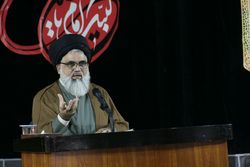 Rasa – Hujjat al-Islam Naqvi said that Ayatollah Khamenei said ‘the cost of resistance is less than the cost of compromise’ and stressed that Pakistan’s leaders must learn from this.
Rasa – Hujjat al-Islam Naqvi said that Ayatollah Khamenei said ‘the cost of resistance is less than the cost of compromise’ and stressed that Pakistan’s leaders must learn from this. RNA – In his Friday prayer sermon delivered to a large and fervent crowd of believers in the Pakistani city of Lahore, Hujjat al-Islam Sayyed Jawad Naqvi referred to the market blast in the Pakistani city of Quetta on April 12th which killed at least twenty people and said, “The grievous incident in Quetta occurred in the place where the majority of terrorist events have taken place – that is the vegetable market which has become a slaughtering place for believers and pilgrims. The filthy seeds of terrorism have been deeply and formally planted in Pakistan. Capital was invested from both inside and outside the country by Arabs and the enemies of Pakistan. They have strengthened the roots of terrorism in the country although they claim that they have ended their support of terrorism in Pakistan. We pray for these martyrs and express condolences to their families and pray for intercession for the martyrs from God.”
The principal of Jami’at Urwat al-Wuthqa Islamic Seminary in Lahore explained, “Since Pakistan is under pressure from the International Monetary Fund (IMF) and other political organizations, Western countries have put very heavy pressure on Pakistan and they have paralyzed the Pakistani economy and the country has been indebted to the IMF for a long time. The current government announced that one day that we will not take loan from the IMF, but the same day they started negotiations with them.”
He said, “We are suffering as a result of all of the decisions that were taken in the past from the time of President Muhammad Zia al-Haqq until today. Therefore, we should look at the decisions that are being taken today and realize what their results will be in the future. Muhammad ibn Salman [the Crown Prince of Saudi Arabia] has said that ‘we had created an extremist group of Wahhabis on the demand of West and today they have told us to end that and start liberalism and we have started that.’”
In regard to the implementation of laws which punish adultery and homosexual sex with death by stoning law in Brunei, Hujjat al-Islam Naqvi said, “The issue of Brunei has not been mentioned in our media. This tiny country is a monarchy and the system of shari’ah has been formally implemented there but this country runs under the Saudi system.”
His Eminence referred to the United States’ designation of Iran’s Islamic Revolutionary Guard Corps (IRGC) as a terrorist organization and the imposition of sanctions on it and said, “In this regard, the Supreme National Security Council of Iran was responded and officially declared the United States as a terrorist government and the United States Central Command (CENTCOM) as well as all its affiliates as terrorist groups. This is not just a statement of condemnation. What this implies is that from now on, the IRGC will act in accordance with the laws of terrorism against the United States. If the United States has said the IRGC is a terrorist organization, then Iran will deal with them accordingly. Iran has replied tit for tat. Iran hasn’t shown any fear or weakness. This means if we see American forces anywhere, we will not consider them as an American force but rather as terrorists and our behaviour will be same as dealing with terrorists.”
He stressed that the greatest investment that Iran did in the Middle East was the establishment of Hezbollah and said, “They are a very powerful force to the extent that they cannot be defeated. We can even say that Iran has not strengthened their own forces to the extent they have strengthened Hezbollah. Israel a deadly monster which usurps lands, defeated a powerful force like Egypt, annexed the West Bank from Jordan, occupied parts of Syria and Beirut but today, this same Israel is shivering in fear in their own land. This is the success of Hezbollah whose secret is Iran. These actions by Iran are a disgrace for Trump and the United States.”
Hujjat al-Islam Naqvi said that in a speech to the Iranian government, people and forces the Supreme Leader of Iran’s Islamic Revolution, Ayatollah Khamenei, said that presently, Iran is under pressure to compromise. One path is that we should submit to the enemies and do what they want us to do. The other path in front of us is resistance, whereby we fight with them or compromise. He said ‘the cost of resistance is less than the cost of compromise.’
“Pakistan’s leaders must learn from this and someone should teach this to them,” he said.
112/915